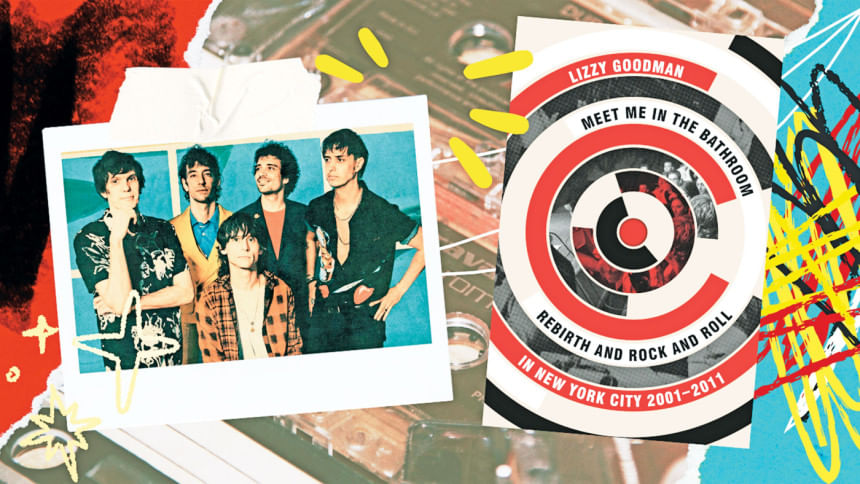I’m with the band (vicariously)

I was born too late for CBGB's, too offline for MySpace and too far away from dive bars. I came to all of it two entire decades late so The Strokes wasn't exactly the soundtrack to my reckless twenties but a band I happened to stumble into during a mid-pandemic spiral.
I wasn't in New York in 2001, stumbling out of Mercury Lounge or sweating through some chaotic Lit Lounge afterparty. I was just disgustingly stuck home in 2020, headphones pressed so tight to my ears it felt like they were holding me together. And as I watched my world shrink to four walls, The Strokes' 2001 album Is This It felt like a door.
There's a particular kind of ache that curls itself into the pages of Meet Me in the Bathroom. Not nostalgia exactly, because you can't really be nostalgic for something you never lived through. It's more of a juvenile, secondhand yearning for a time long gone. Lizzy Goodman's oral history of New York's early-2000s rock revival reads more like a scrapbook: dog-eared and contradictory, a chorus of half-truths and cigarette-stained memories, and mythologies being constructed in real time.
The book is a labour of love; it ended up taking six whole years to write because Lizzy Goodman was personally sitting down and interviewing all these musicians separately, and then trying her hardest to edit practically thousands of hours from about 200 interviews into a concise book that is, well, a little more than 600 pages. Goodman made the creative decision to pen it down as oral history instead of a memoir, so the entire book is a transcription of these conversations, an endless stream-of-consciousness narrative of Name-colon-dialogue. She admits the project nearly killed her.
I scoured every nook and cranny of the internet for a pdf version of this book almost immediately after my required binge of every video of The Strokes I could physically find on the internet, and I came up empty, satiating myself with every little chunk and peek I could find on reddit threads and magazine reviews as I messaged every single book page I knew on Instagram.
So when I finally picked up Meet Me in the Bathroom, I wasn't looking for accuracy. I didn't want another Wikipedia entry of bands and venues and historically accurate anecdotes—in a naïve way, I just wanted an 'in', albeit in a metaphysical and vicarious sense of the word, I'm afraid, but I was extremely eager for any access to the capital b-Before: to the borrowed couches where entire albums came to shape, before the internet turned coolness into a currency and Julian Casablancas looked visibly exhausted in every photo. And the fact that it came to me in the form of a book annotated with gossip straight from the horse's mouth was perhaps the best part.
Goodman knew this instinctively. Her own insider status mattered because it gave her emotional skin in the game (along with the backstage passes). She grew up alongside a lot of these people, getting handed flyers for their gig on a random Tuesday night. She knew Nick Valensi "as a kid", "mothered" him through early demos—and even then, she couldn't predict that The Strokes would become the voice of a generation. That proximity is what makes her recount stand out. She's not assuming things from across the hotel bar, nor is she peering in through a window. She's right there, bleary-eyed at 3 AM, trying to make sense of the noise like everyone else.
Especially in a post-internet era, where personal memory is endlessly fragmented and curated by feeds, 'explore' pages and disappearing stories, it is now that the idea of a shared memory, of a communal version of the past, feels more valuable than ever. It is that itch of wanting to desperately hold on to an experience before it slips away. In the book, Steward Lupton of Jonathan Fire*Eater described it perfectly
For me, that's the hook of anecdotal literature: its authenticity is not tied to dates or precision, but to the people who are trying to remember said dates. It is extremely fractured and unreliable but that unreliability is what makes it stand out. Memory bends and betrays and it's not supposed to be clean. But it feeds the part of us that wants to live vicariously through other people's lives, real people's lives. Handing out access codes into worlds I wasn't cool enough, old enough, or lucky enough to belong to. Goodman says in the introduction for the book, "We were all—every kid in the crowd and every person on stage—chasing the same thing: a feeling of rebellion, of possibility, of promise, of chaos," and it resonates, even if I was never sweating it out in the Mercury Lounge. It's still just as electric.
Especially in a post-internet era, where personal memory is endlessly fragmented and curated by feeds, 'explore' pages and disappearing stories, it is now that the idea of a shared memory, of a communal version of the past, feels more valuable than ever. It is that itch of wanting to desperately hold on to an experience before it slips away. In the book, Steward Lupton of Jonathan Fire*Eater described it perfectly when he said it felt like having, "nostalgia for an hour ago." Perhaps that is why we crave oral histories the way we do, that's why we are drawn to the Kim Gordons and Legs McNeils of the world. We lean in when a rock star admits to being broke, scared, or petty, lingering even as they describe the age-old story of how heartbreak made them write better.
In a 2018 interview published in The Stony Brooke Press, Lizzy Goodman explains why she chose to do an oral history, "It's supposed to feel like a time capsule… It's not reported fact. […] The hope, then, is that the truth exists for the reader in being able to internalize the sensory, absolute value truth of what happened." Goodman herself described her role not as historian but as translator: she wasn't chasing objective fact, but "emotional fidelity." It's like being handed a stack of scribbled in diaries and being told, "go on, figure out what happened." It's like trying to make sense of a chorus of unreliable narrators and in doing so I felt oddly tethered to a time I was never actually a part of, when New York was gritty and golden.
I think that's why we keep returning to memoirs and autofiction like these. Not for the facts, but for the permission to treat our own lives like folklore. Memoirs and oral histories hold that promise.
There's something romantic about visiting a time just out of reach. To believe that one day, someone will stitch together our fragments, our anecdotes, our best and worst nights, and call it history. It does not have to be the official story, just the echo of what it felt like to live it.
And Meet Me in the Bathroom lets us believe that—for almost 700 pages, at least.
Arshi Ibsan Radifah is a literature major who loves unreliable narrators and Wes Anderson movie sets. If she had it her way she would have liked to play bass for a girl band in the '90s, but for now she'll suffice by rewatching Empire Records.

 For all latest news, follow The Daily Star's Google News channel.
For all latest news, follow The Daily Star's Google News channel. 



Comments